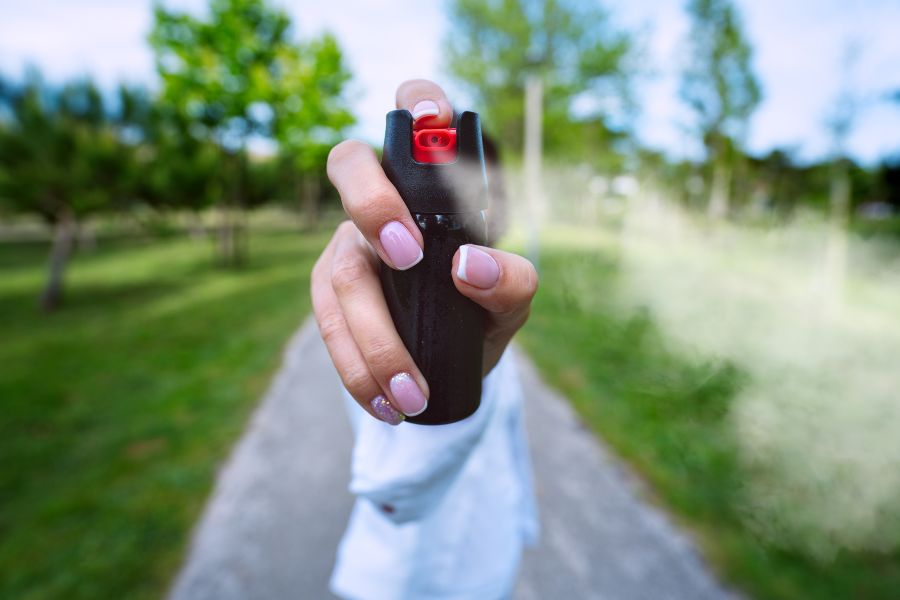First off, is pepper spray legal in Canada? The short answer is: No. The sight of murder cases splashed on national papers drives the desire to acquire self-defence tools. In a world where personal safety is paramount, the question of arming oneself for self-defence often comes to the forefront. Pepper spray, a compact and seemingly effective tool, has emerged as a subject of intense debate within the Canadian legal framework.
This article delves into why pepper spray isn’t legal in Canada, peeling back the layers of legislation, concerns about misuse, and the broader context of self-defence.
Let’s dissect the why, how, and what of pepper spray’s role in the Canadian legal landscape.
Legal Context and Pepper Spray Classification
The thought of Canadian serial killers or stories of famous killers in Canada causes people to cower in fear. And for most people, it’s a wake-up call to stop being vulnerable. Thus, pepper spray is a popular self-defence tool used for personal protection, but it has some legal complexities within the framework of the Canadian Criminal Code.
The Canadian Criminal Code highlighted certain items as prohibited weapons, aiming to prevent potential threats to public safety. So, unless you are authorized to carry concealed weapons, it’s a crime to possess weapons that are dangerous to the public. Bear spray, prescribed for wildlife deterrence, remains legal in specific scenarios. But personal defence pepper spray? Not quite, due to concerns about potential misuse. This distinction underscores the Canadian legal system’s cautious approach to regulating tools with the potential for harm.
The legality of carrying pepper spray, legally and illegally, hinges on its classification within the broader context of prohibited weapons. However, when you carry pepper spray in Canada, you will be guilty of a criminal offence.
Basically, the Canadian Criminal Code reflects the nation’s commitment to balancing individual protection and preventing unintended harm. The ongoing discourse surrounding pepper spray’s legality within Canada highlights the delicate equilibrium between personal empowerment and public safety.
Key Facts About Pepper Spray and Bear Spray
- Purpose Distinction: Bear spray and personal defence pepper spray serve different purposes.
- Legal Permissibility: Bear spray, often called bear mace, is permitted to deter wildlife.
- Human Interaction Concerns: Personal defence pepper spray prohibition arises from concerns about potential misuse in human interactions.
- Legal Categorization: Bear spray aligns with Canadian self-defence laws as a tool for specific situations.
- Prohibited Weapon Classification: Personal defence pepper spray falls under prohibited or restricted weapon.
- Intent Matters: Legal status depends on intent—personal defence vs. wildlife deterrence.
- Public Safety Balance: Canadian self-defence laws consider both personal safety and public welfare.
- Risk Mitigation: Prohibition prevents criminal offences, criminal charges, and the potential risks of misuse.
- Chemical Weapon Debate: Discussions on whether pepper spray is a chemical weapon shape its legal status.
- Navigating Self-Defence Laws: Pepper spray’s legality within Canadian self-defence laws involves careful considerations.
Pepper Spray and Canadian Self-Defence Laws
Pepper spray’s classification as a prohibited weapon aligns it with other potentially harmful substances regulated by Canadian law. The scrutiny over these substances extends to carrying concealed weapons. In fact, it encapsulates the discreet possession of items like pepper spray and raises concerns about adherence to legal regulations.
While individuals may have personal safety motives, the legality of possession hinges on compliance with specific regulations designed to balance personal protection and public safety.
Under Canada’s legal framework, pepper spray’s status as a prohibited weapon means its possession translates to weapon offences.
The presence of the Firearms Act further shapes the landscape, addressing various facets of weapon offence-related matters to ensure responsible weapon ownership. Notably, the discharge of pepper spray, classified as a prohibited weapon, carries potential legal ramifications.
Legal Implications of Possession and Use
Navigating the legal aspects of pepper spray involves intricate considerations guided by Canadian law and regulations. To better understand the nuances of carrying concealed weapons, possessing pepper spray, and potential weapon offences, we’ll explore the Firearms Act.
Carrying concealed weapons, including pepper spray, necessitates a clear understanding of legal boundaries and ethical responsibilities. The interplay between personal safety and the risk of misuse is central. That’s because Canadian self-defence laws seek an equilibrium between individual empowerment and collective security.
The specific legal implications vary depending on the circumstances and the province you are in. Hence, it’s advisable to familiarize yourself with the local regulations regarding the use of pepper spray.
If you use pepper spray, you may face legal consequences like charges of assault or possession of a prohibited weapon. It’s crucial to exercise caution, assess the situation carefully, and use pepper spray only when necessary and in accordance with the law.
However, laws can change and vary, so it’s always a good idea to consult local law enforcement or legal professionals. This ensures you have the most up-to-date and accurate information regarding the legal implications of using pepper spray in Canada.

Dissecting the Firearms Act
Possessing pepper spray, driven by personal safety concerns, requires awareness of its classification as a concealed weapon. The legal complexities underscore the gravity of weapon offences within Canada’s framework.
The Firearms Act provides a foundation to prevent weapon offence-related incidents, prioritizing public safety and responsible tool ownership.
Dealing with self-defence tools, like pepper spray, carries implications beyond personal intent. Since pepper spray is categorized as a weapon, its discharge holds legal significance. Thus, you need to be ultimately careful, as only a few situations make pepper spray legal.
The Firearms Act’s framework shapes Canada’s perspective on weapon offenses, highlighting the importance of caution when possessing and using self-defence tools.
This interplay between personal safety and legal adherence explains why pepper spray remains prohibited in Canada.
Contextualizing Pepper Spray and Self-Defence
Is it ever legal to use pepper spray in Canada? Find out the answer to this question below.
The Legal Ramifications of Discharge
As discussed earlier, pepper spray discharge carries implications beyond one’s initial intent. That’s expected. Since pepper spray is a weapon, “any shot” taken with this weapon attracts legal consequences.
Thus, it’s essential to understand and adhere to the associated responsibilities when using such self-defence tools within the boundaries of Canadian law.
Pepper Spray and Bear Attacks
While pepper spray is prohibited for personal defence, its potential effectiveness in countering specific situations, such as bear attacks, raises pertinent questions. Is it right to use this tool to counter wildlife attacks?
Here, the interplay between the prohibition of pepper spray and its potential to deter bear attacks is eminent. This highlights the intricate relationship between self-defence strategies and the unique circumstances that might arise. But that’s where a bear mace comes in. However, using bear spray becomes a criminal offence when used on humans.
Concerns, Misuse, and Alternative Solutions
While pepper spray is often considered a self-defence tool, its classification as a prohibited weapon underlines the concerns and potential misuse within the Canadian legal context.
Concerns And Misuse
Pepper spray’s status as a prohibited weapon stems from the careful considerations enshrined in the Canadian Criminal Code. The distinction between bear spray and personal defence pepper spray is emblematic of the code’s discerning approach.
Bear spray finds legality due to its specific application in deterring wildlife encounters. In contrast, personal defence pepper spray is classified as prohibited, owing to concerns about its potential misuse in human interactions.
One of the central concerns with pepper spray lies in its potential for misuse or unintended consequences. Its accessibility as a self-defence tool raises questions about its responsible use.
The fear of pepper spray falling into the wrong hands and worries about criminal activities inspired its classification among prohibited weapons. Canadian law aims to deter criminal behaviors, and this prohibition aligns with the broader public safety objectives.
The misuse of pepper spray highlights the complex ethical landscape surrounding its legality. While the intent behind carrying pepper spray and carrying pepper spray legally in Canada is often personal defence, the risk of misuse poses challenges. This concern extends to the broader spectrum of prohibited weapons and the potential for criminal offences that could arise from their abuse.
Alternatives
In light of these concerns, discussions about alternative solutions to pepper spray have popped up. Some proponents argue for exploring non-lethal options that can incapacitate an aggressor without causing harm. Tear gas, for instance, is one alternative, regulated differently under Canadian law. This emphasizes the multifaceted approach to self-defence tools and their legal categorization.
Striking the Balance- Summary and Key Takeaways
Due to the potential misuse, pepper spray falls among prohibited weapons. This categorization seeks to prevent possible criminal activities and maintain public safety. Despite its potential benefits for personal defence, the Canadian legal system prioritizes responsible weapon usage.
Summarily, pepper spray prohibition in Canada manifests the nation’s commitment to striking a balance between personal empowerment and collective well-being. The intricate interplay of Canadian self-defence laws, concerns about misuse, and the pursuit of alternative solutions is evident. However, all these factors have shaped the legal status of pepper spray.

